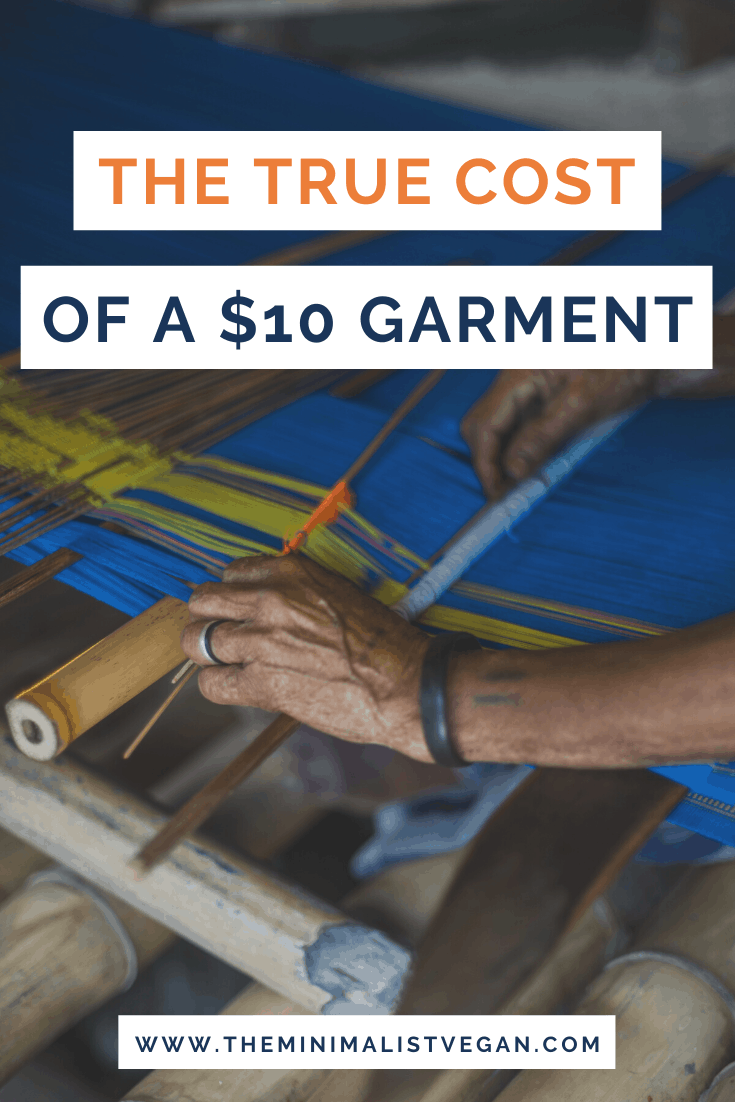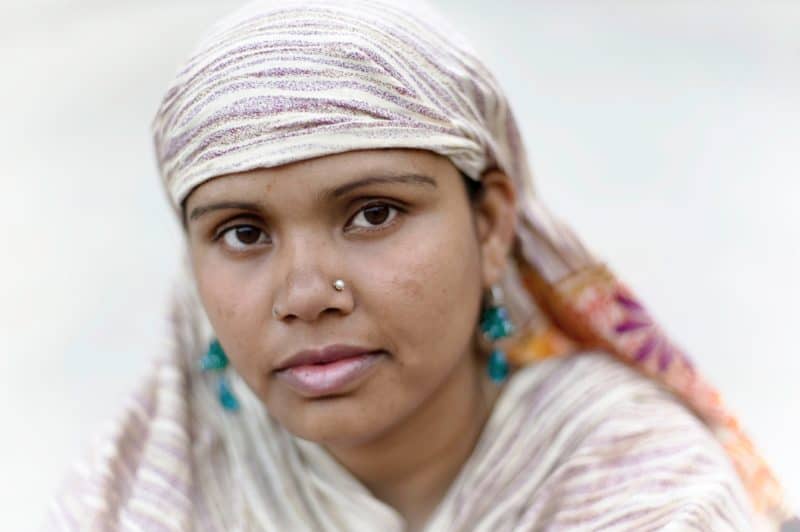When you think about fast fashion, what is the first thing that comes to mind? Cheap clothes? What about slave labour in sweatshops?
How many people pause to think about their true cost of a $10 garment?
The True Cost is a documentary that we have talked about before, it’s an amazing way to educate yourself on how the fast fashion industry is contributing to an array of issues globally, from worker exploitation to environmental degradation.
This industry (as well as lots of others) really gets under my skin. It’s not good enough what we’re doing. Which isn’t much, to change the demand for these types of products.
The fast fashion industry was designed to be a win-win situation so that the people in Western society can get beautiful clothes at reasonable prices, and for the workers in third world countries to get jobs and start lifting themselves out of poverty.
That didn’t happen. Instead, fashion brands fought laws to protect their own interests and to keep the profits for themselves. That’s all they care about, profit.
It all started back in the 1950s, and since then it has increased year by year which is now an industry worth well over three trillion dollars. One in every six people works in the fashion industry in some way along the supply chain. There are forty million garment workers worldwide, and 85% of them are women.

Throw-away mentality and how we can justify buying new items every second day
Instead of having two collections a year (Fall/Winter and Spring/Summer), we have 52 collections a year. There’s a new look every week and consumers always have something different to buy. Fashion shouldn’t be a disposable product, it should be garments that are made to last you a lifetime.
My grandmother is 89 and still has clothes that she bought from 50-60 years ago in perfect condition. She wears them because they are timeless pieces.
Fast fashion is cheap enough to throw away without even thinking twice about it. Since it costs you less than a meal, you don’t need to feel guilty about it.
80 billion pieces of new clothing are bought every single year. This is madness. On average, a garment also lasts five weeks in a wardrobe. Unless you follow more mindful, conscious practices like ours, fashion brands can make you feel rich by how much you can buy. However, they are in fact making us poorer and less happy as the only ones getting rich are the fashion labels.
The fashion industry is the clearest example of where globalisation has failed. We had globalisation and capitalism kick in and the workers were instead exploited, rather than supported to live better lives.
The garment factory owners would constantly have to negotiate with fast fashion brands and compete with other factories to get the business. They would only do business with them if they were prepared to do the job for less than the competition. This was the only way they could keep the business of the big brands.
So workers would get paid less to be able to meet the demands of the brands that want the garment made next to nothing. Cutting corners and disregarding safety measures have become the accepted part of doing business.
They deliberately outsource to countries where wages are low and are kept low. Some workers would get paid as little as $10 a month. If they chose to speak up about wanting change, they would be fired or beaten. In the case of many factory workers, risking their lives for their job was the norm.
A simple break down of the process
When you look at a garment, have you ever considered the water, land, chemicals, labour that went into making that product?
The cost that we are paying as a planet and a global community for those cheap clothes is the following:
- The pollution of the environment
- The people making the clothes that don’t have fair working conditions
- Our air
- The farmers that don’t have healthcare
- The workers that have died in building fires or collapses
- The workers in leather tanneries that are exposed to heavy chemicals daily, which also contaminates their drinking water

And this is not all of it. The cost is simply too high. All this chemical exposure has lead to new generations of children having shorter life expectancies compared to their parents in small villages. Yet this is the only work that they can get. How is that fair?
Not to mention the GM seeds that are being planted to grow cotton. They are 17,000% times more expensive than other seeds! And they still manage to dominate the market, as farmers have no choice but to use them. Even though they still have to spray expensive chemicals on their crop and buy new seeds every single year. This is one of the reasons that in 2014, 250,000 farmers in India committed suicide. They simply can’t pay off their debts to the seed company. It’s a vicious and sad cycle. Why is no one talking about this?!
The truth behind your garment from start to finish looks something like this:
- Grow crops for fabric – which in many cases is GM crop (unless organic).
- This practice has an impact on the environment and workers that are harvesting the crop are they are heavily sprayed.
- Farmers and workers are at higher risk of contracting a serious illness – like cancer.
- The factory workers that make the garments are underpaid, overworked and work in unsafe conditions.
- Fashion brands want things done cheaper while retaining their own profit margin push them to cut corners, risking their own lives for fashion.
- The garment is in the shops for $10 for you to buy and dispose of when you wish.
I made a point to mention that wearing clothing or sleeping on sheets that are made with toxic chemicals like formaldehydes, is not healthy for you or the planet. Considering that our skin is the largest organ, and we wear something pretty much 90% of the time, these chemicals end up in our bloodstream as they are being absorbed.
Consider more of what you put on your body as well as what you put in your body. Your toxic load adds up quickly!
It’s time to re-think your choices
So if you don’t want blood on your hands or wear garments that are made of toxic chemicals, it’s time to re-think your wardrobe. Look at the ‘Made in…’ tag on your garment, look at the breakdown of materials used to make it and how this garment came into existence. Are you supporting the exploitation of vulnerable people? Are you buying something just because it’s $10? Will you have it in your wardrobe in 10 years time?
Garment workers should be rewarded rather than exploited. They deserve to be working in safe and fair conditions just as much as we do. What changes will you make today? Share with us in the comments below what you’re doing to help end fast fashion.

Other articles you’ll love:
- Mindful Consumption: A 6-Step Guide To Consuming Better
- What Is Vegan Leather?
- The Psychology of Appealing Brands
- 50+ High-Quality Ethical & Sustainable Clothing Brands
- Spend More Money As a Minimalist Vegan


Good morning,
Thank you for the informative articles. One thing that blows my mind is that these unethical working conditions are illegal in the U.S.; however, it is legal for U.S. citizens to participate in and perpetuate these unethical practices in other countries. We have different standards for our U.S. citizens in our country than in other countries. It’s shameful. All for dollars. In the end, what will matter is were we ethical people – were we kind, did we respect life, did we honor our word. Do no harm – what a great motto to genuinely live by.
It must take so much time to do all the research you do. Thank you for all of your efforts and these well-composed articles.
Kind regards,
Dana
Hi Dana, thanks so much for your message!
It can be discouraging to learn the truth but it can also light a fire us to want to do something about it! Thanks again, Maša
This article was so important for me to read just now. I’m a recent vegan and making lots of other changes in my life and yet, it just wasn’t in the forefront of my mind to seriously examine the clothing I buy (other than it not being made from animal products). I feel lost however. I truly cannot afford to buy $400 coats and all of these expensive, but truly cruelty free brands every few months for my ever growing toddler, y’know? We’re planning a trip home to California soon (I’m an American living in Denmark) and I’m planning on some outlet shopping at least for my daughter. I just- almost don’t know where to start. Because agreeing 100% with a philosophy and practice and putting it into practical action are two different things, y’know?
Anyway, would love some more guidance and thanks so much for the article!
Hi Lindsay, thanks for sharing. I completely understand where you’re coming from. One service that I heard of for parents with babies and toddlers is one that offers a monthly subscription and they send you quality made garments each month for you to use and then post back once your child grows out of it. They’re not brand new, but because they are well-made pieces (typically high end, fair-trade and organic fabrics that most people couldn’t afford to buy) you receive clothing that will be used over and over again. Can’t remember the name, but maybe look that up online? Second hand is also a great option! Hope that helps 🙂
This is a great article and a topic more people need to be aware of. I watched the true cost a while ago and have been consciously making more ethical choices about what I buy and it’s been an interesting experience.
When you are committed to only purchasing ethically made products, you realize how difficult they can be to find. At first I found it frustrating that when I needed something I couldn’t just buy the first thing I saw. But then I realized that’s actually wonderful and more like how it should be. Taking the time to find the right garment for your needs that is also in line with your values takes significantly more effort, but why shouldn’t it? The idea that we don’t need to spend time considering our purchases is exactly how we got to this toxic level of consumerism. So now when I spend the time carefully considering a purchase from every level I feel like I’m fighting back against an exploitive system and exercising my purchasing power in a more deliberate way – which is so freeing! I think this concept fits in SO well with both veganism and minimalism. So yeah, anyway, thanks for the great article!
So true! I still find it pretty difficult, but once I find a brand that aligns with my values, I make sure I continue to support them. Well said, thanks for sharing 🙂
Hi Masa, great article! I dream for a world with more mentality like yours!
I look after my clothes and it lasts a lot! I have a dress I love from 1997! When I need clothes I usually go to charity shops, if not there, then try new ones… but would like to know if you have a list of reliable brands and/or a list of banned brands. Thank you very much!
Thanks Vanessa! Glad to hear, I wish more people would have your mentality too 🙂
I have a blog post of great brands here, see if anything suits – https://theminimalistvegan.com/ethical-fashion-stores/
Thank you for the post Masa.
It is really eye opening to see just how disturbing the fashion industry is. As if all of the points you have brought up weren’t enough, there is still the question of what happens to clothes after they are disposed of. Most clothes, because they are blended with synthetic fibers, cannot be recycled or decompose. Even clothes that are donated to thrift stores, if they do not sell, are thrown away. They will go to a landfill and take thousands of years to fully decompose, or be incinerated while releasing their toxic chemicals into the air and ground.
After reading Michael’s post about wearing the same clothes every day, I decided to try it. I wear the same colored light grey organic cotton t-shirts and jeans without a leather tag. I was worried people might think I never changed my clothes, but so far no one has noticed. If we commit to a single wardrobe or at least a few favorites we wear all the time, we would appreciate the clothes we have and reduce the suffering to make them.
Thanks for adding and sharing Dominic. Yes, I think it’s about 20% of all donated clothes that gets sold and the rest ends up going to landfill. So the mentality of donating to charity and it going to a good home is causing a lot of issues in itself. People have to be more mindful of what they buy in the first place.
Glad to hear you’re testing it out. Michael would be happy to hear that it’s working for you, fewer decisions to be made is always a great thing 🙂
Hi and thanks for this article. I do try to look for organic cotton, however, many clothes now are made from man made materials. Can you help me to understand which different fabrics are the most sustainable? Thanks.
Hi Andrea, we actually have a post about that topic – https://theminimalistvegan.com/sustainable-vegan-textiles/ Hope you find it helpful!
Love my slow Sunday mornings peppered with insight from you guys xx
Thank you lovely xx